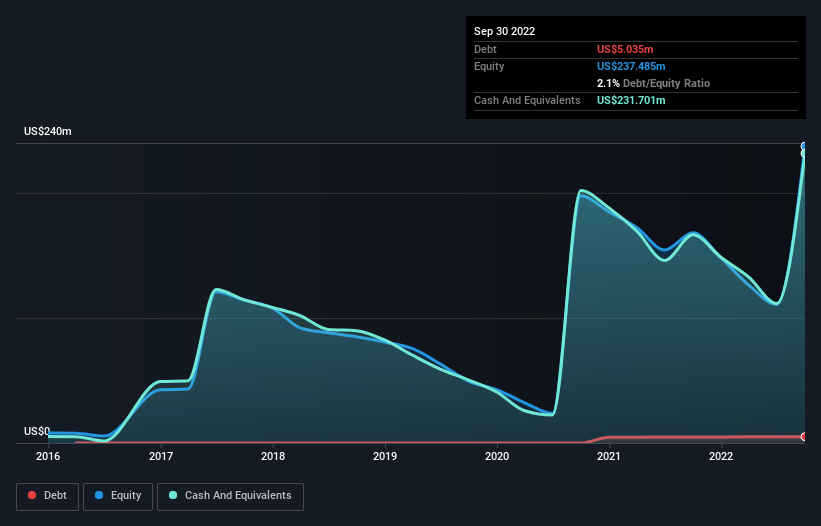
The external fund manager backed by Berkshire Hathaway's Charlie Munger, Li Lu, makes no bones about it when he says 'The biggest investment risk is not the volatility of prices, but whether you will suffer a permanent loss of capital.' So it might be obvious that you need to consider debt, when you think about how risky any given stock is, because too much debt can sink a company. We can see that Verona Pharma plc (NASDAQ:VRNA) does use debt in its business. But the real question is whether this debt is making the company risky.
When Is Debt A Problem?
Generally speaking, debt only becomes a real problem when a company can't easily pay it off, either by raising capital or with its own cash flow. Part and parcel of capitalism is the process of 'creative destruction' where failed businesses are mercilessly liquidated by their bankers. However, a more common (but still painful) scenario is that it has to raise new equity capital at a low price, thus permanently diluting shareholders. Of course, plenty of companies use debt to fund growth, without any negative consequences. The first step when considering a company's debt levels is to consider its cash and debt together.
Our analysis indicates that VRNA is potentially undervalued!
What Is Verona Pharma's Debt?
The image below, which you can click on for greater detail, shows that at September 2022 Verona Pharma had debt of US$5.04m, up from US$4.82m in one year. But it also has US$231.7m in cash to offset that, meaning it has US$226.7m net cash.

A Look At Verona Pharma's Liabilities
We can see from the most recent balance sheet that Verona Pharma had liabilities of US$32.1m falling due within a year, and liabilities of US$5.26m due beyond that. Offsetting this, it had US$231.7m in cash and US$20.3m in receivables that were due within 12 months. So it can boast US$214.6m more liquid assets than total liabilities.
It's good to see that Verona Pharma has plenty of liquidity on its balance sheet, suggesting conservative management of liabilities. Given it has easily adequate short term liquidity, we don't think it will have any issues with its lenders. Simply put, the fact that Verona Pharma has more cash than debt is arguably a good indication that it can manage its debt safely. There's no doubt that we learn most about debt from the balance sheet. But ultimately the future profitability of the business will decide if Verona Pharma can strengthen its balance sheet over time. So if you want to see what the professionals think, you might find this free report on analyst profit forecasts to be interesting.
Given it has no significant operating revenue at the moment, shareholders will be hoping Verona Pharma can make progress and gain better traction for the business, before it runs low on cash.
So How Risky Is Verona Pharma?
Statistically speaking companies that lose money are riskier than those that make money. And in the last year Verona Pharma had an earnings before interest and tax (EBIT) loss, truth be told. Indeed, in that time it burnt through US$69m of cash and made a loss of US$82m. Given it only has net cash of US$226.7m, the company may need to raise more capital if it doesn't reach break-even soon. Even though its balance sheet seems sufficiently liquid, debt always makes us a little nervous if a company doesn't produce free cash flow regularly. The balance sheet is clearly the area to focus on when you are analysing debt. However, not all investment risk resides within the balance sheet - far from it. For instance, we've identified 3 warning signs for Verona Pharma (1 is potentially serious) you should be aware of.
If, after all that, you're more interested in a fast growing company with a rock-solid balance sheet, then check out our list of net cash growth stocks without delay.
New: Manage All Your Stock Portfolios in One Place
We've created the ultimate portfolio companion for stock investors, and it's free.
• Connect an unlimited number of Portfolios and see your total in one currency
• Be alerted to new Warning Signs or Risks via email or mobile
• Track the Fair Value of your stocks
Have feedback on this article? Concerned about the content? Get in touch with us directly. Alternatively, email editorial-team (at) simplywallst.com.
This article by Simply Wall St is general in nature. We provide commentary based on historical data and analyst forecasts only using an unbiased methodology and our articles are not intended to be financial advice. It does not constitute a recommendation to buy or sell any stock, and does not take account of your objectives, or your financial situation. We aim to bring you long-term focused analysis driven by fundamental data. Note that our analysis may not factor in the latest price-sensitive company announcements or qualitative material. Simply Wall St has no position in any stocks mentioned.
About NasdaqGM:VRNA
Verona Pharma
A clinical stage biopharmaceutical company, focuses on development and commercialization of therapies for the treatment of respiratory diseases with unmet medical needs.
High growth potential with adequate balance sheet.
Market Insights
Community Narratives




